The (4) Signs You’re In A Plumbing Emergency And (What To Do Next)
Do you have a slow-moving drain located in your kitchen, in one of your bathrooms, or in another area of your home?
It might annoy you to no end and make you want to pull your hair out. But a slow-moving drain is not considered to be a plumbing emergency. You can call on a plumber at your earliest convenience to have them come and take a look at it.
There are, however, other plumbing problems in your home that could become even more problematic than they already are if you don’t do something about them. It’s important to call a plumber ASAP if you notice one of them pop up.
Here are four signs that you might have a plumbing emergency on your hands and information on what you should do next if you spot any of them.
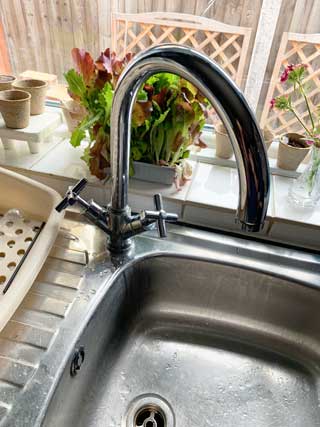
1. Your Water Isn’t Working at All
Did you just go to turn on the water in your kitchen sink or in the bathtub in your bathroom only to realize that your water doesn’t seem to be working?
If you live in an apartment, there is a chance that your landlord may have turned off the water for one reason or another. If you live in a home, your spouse may have shut off the water to check on some aspect of your plumbing system.
But if you look around and discover that there isn’t a good reason for your water not to be working, you might be experiencing a plumbing emergency. You’ll want to get a plumber on the phone right away to schedule a repair.
There are times when the water in a home will stop working because of a leaky or broken pipe somewhere in a plumbing system. There are also times when an issue with a water main might be to blame for a lack of water.
Whatever the case, you’re not going to be able to live very long without water. It’ll make it difficult, if not impossible, to do things like cook, bathe, and even just brush your teeth.
An emergency plumber can come out and take a look at your plumbing system to see what seems to be the problem. It shouldn’t take too long to diagnose and fix the issue at hand.
2. Your Toilets Are Backing Up Into Your Home
The toilets in your home are designed to take wastewater and move it away from your home. They’re not supposed to send wastewater shooting back into your home under any circumstances.
But if there is a clog in your plumbing system or in your sewer line, it could cause waste and wastewater to back up into your home. This can lead to all kinds of dangerous health complications, and it can lead to property damage, too.
Most homeowners can take care of a routine toilet clog. But if your toilet is overflowing and sending waste and wastewater everywhere, you’re in the middle of a plumbing emergency.
There may be a problem in your plumbing system. But there also may be an issue in the local sewer system that’s causing your toilet to overflow.
Back in 2013, a so-called “fatberg” in the London sewer system caused a large number of toilets in the Kingston section of the city to get backed up. A plumber can let you know if it’s your home or the sewer system that’s to blame for your toilet troubles.
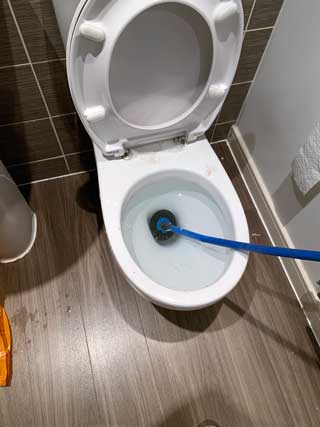
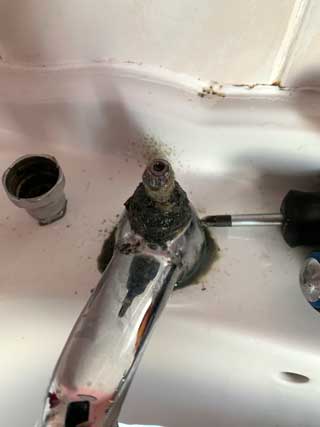
3. Your Water Pressure and/or flow Is Non-Existent
There is almost nothing worse than hopping into the shower to bathe and relax, only to find out that there isn’t enough water pressure and/or flow for you to do either. A lack of water pressure and/or flow will ruin your shower and make it hard for you to wash up.
Your home’s water pressure and/or flow could be very low for any number of reasons. Low water pressure and/or flow in a home can be caused by:
- Too many water sources being used at one time
- A partially-closed water meter valve
- A failing water pressure regulator
- Plumbing pipes that are on the older side
- An issue with the local water supply
No matter the reason, low water pressure and/or flow will make it hard to function normally in your home. It should be considered as a plumbing emergency and should always be dealt with by a professional.
4. Your Plumbing Pipes Are Frozen
You don’t have to worry about the plumbing pipes in your home freezing at most times of the year. The temperature in London doesn’t fall below the freezing mark on a regular basis, even during the winter.
But if you have plumbing pipes in your home that are exposed to cold air in the winter, they could freeze up on you on very cold days. If they do, it’s important to call a plumber right away.
Frozen plumbing pipes are at risk of bursting at any moment. If your pipes burst, the water in them can shoot out everywhere and cause a ton of damage. The pipes themselves will also need to be repaired or replaced to get your plumbing system back up to speed.
Try to insulate any plumbing pipes that could be exposed to cold temperatures in the winter. And make sure you have a plumber on speed dial just in case your plumbing pipes ever freeze.
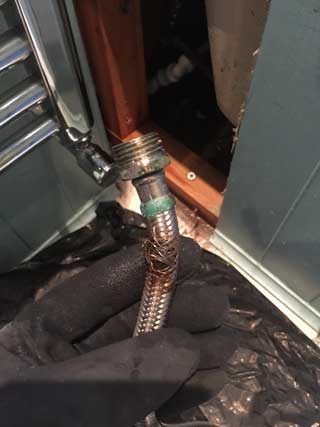
Don’t Ignore a Plumbing Emergency in Your Home
Since you don’t see most of the plumbing pipes in your home every day, you might not spend much time worrying about them. “Out of sight, out of mind” is the approach that most people take to their plumbing systems.
It’s important for you not to be like these people. Keep an eye out for a plumbing emergency at all times and get in touch with an emergency plumber if you see one. It could help you avoid catastrophic plumbing problems and prevent plumbing issues from taking a major toll on your home.
Do you suspect that you might have a plumbing emergency taking place right now? Contact us to schedule an appointment with a plumber.
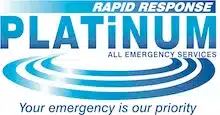
Thanks for this blog. I learned some tips about this blog. I had experienced these problems last week thanks to my friend who help me with my problem. I hope you post more blog helps us. So that we can learn more. Thanks for the ideas you shared with us. It is a big help not just for me but for all the readers who don’t have any ideas about this kind of tips.
Thanks, Ruben for stopping by, you are always welcome. Glad to hear you are enjoying the posts and they are helping you out.
Thank you for mentioning that you may be experiencing a plumbing emergency if your sewer line has been clogged and is causing waste to overflow. My wife and I have noticed that water is starting to overflow from our master bathroom’s toilet, and we are worried that the water will warp our new hardwood flooring if the problem is not fixed. Maybe we should hire an emergency plumber to help us right away.
Thanks, Eli for your comment. Yes, water leaks are trouble for any kind of timber flooring in a home. An emergency plumber could help you but it sounds like your problem has been going for a little while! Book yourself a plumber to come out during normal working hours to investigate the problem. That way it is bound to be a little lighter on your pockets.
Thanks for posting another great blog, full of ideas. It is very important to know what needs to be done in an emergency plumbing situation, so you can hire the best service for you in order to fix your problem successfully. I look forward to reading more blogs on your site in the future.
Welcome back again Harold. It is great to hear you enjoyed the post.
My husband and I have both noticed that lately our water pressure when we shower has been pretty low, and it’s getting to be pretty annoying and inconvenient. I appreciate that you mentioned that low water pressure could come from a partially closed water calve or older plumbing pipes. I would like to have normal water pressure again, and I’m sure my husband would too, so I’ll have to look into calling a plumber that can help us figure out which problem it is and get it fixed.
Hey, Michaela thanks for stopping by and leaving a comment. Before you call out a plumber put a call into your water supply utility just to make sure there are not any external issues first with your water supply. Then you can try to find a local plumber to look over the plumbing in your house if it is not a supply issue. Might save you some money. Good luck.
I didn’t know that your water pressure may decrease if your pipes are too old. My wife and I have been unable to shower after work because our water pressure has been too low, and we’re worried the piping may be over 60 years old since my uncle previously owned our home. We’ll hire an expert to help fix our plumbing.
Thank you, Toby, for your comment. Yes older plumbing systems and in most commercial settings often use steel pipework. In plumbing systems, steel pipework that is used for carrying water is normally coated with zinc thus becoming galvanised steel. Over many years the zinc coating wears away as the water passes through the system a lot like a stone on a beach gradually gets smaller and smoother.
Over time corrosion sets into the steel as the zinc protection wears away. This can often cause restrictions in your plumbing system affecting both pressure and flow. Thus with most things deteriorate over time plumbing materials are no exception to this rule. Glad to see you will be instructing an expert. An expert will be able to determine the materials of your system and discount any other issue that may be affecting your plumbing system.
Thanks for sharing this is a great article, an article full of ideas. It is very important for everybody to know what they should do in an emergency plumbing situation. The blog is straight to the point.
Thanks Simon for taking the time to read. We are pleased to know the blog helped you, stay safe :).
Thank you for telling me that if there’s no valid reason for the lack of water in my bathroom and kitchen faucets, then it might mean that I’m in the middle of a plumbing emergency. I experienced this shortly yesterday and since it came back after half an hour, I didn’t realize that it was something that should be taken seriously. I’ll try to call a plumbing expert this afternoon and let them check if something needs to be repaired with my water pipes.
You are very welcome Zoe. In your situation since your water returned after a short duration this is likely to be caused by external work being carried out. I would place a call into my water service provider before calling a plumber. That might save you some money! It is possible that a repair had to be carried out on your street or in your area. This would explain the short duration without water. If there is no external reason then call a local plumber and have your plumbing system checked out. Goodluck stay safe.
Thanks for writing this it helped me out in advance of my plumbing problem.
Glad to have helped you out. Please subscribe for future posts.
Nice Article…Very interesting to read this article. I have learned some new information. Thanks for sharing.
I’m thankful that you mentioned how a clog in your plumbing system may cause fluids to come out of your toilet and damage your home. I remember my brother telling me that his hardwood flooring has started to become warped now that toilet water overflows onto his bathrooms floors whenever he tries flushing. Maybe he should consult an expert that can handle his issue.
Hi Stefan you are most welcome. Yes water can cause so much damage to property. Any plumbing leaks need to be addressed straight away. Thanks for stopping bye. Hope to see you again soon. Stay safe.
Nice blog on plumbing services and gas fitting services. A well written and informative blog.
Thanks, Joe. Appreciate you checking our blogs out. Stay safe.
It’s good that you mentioned how you may have a plumbing emergency if your wastewater is getting all over your house. My brother has noticed that his toilet has been overflowing more often, and he’d like to fix the issue before he sells his house. He should think about hiring a professional that can help with his problem.
Thanks, Darren. Great you enjoyed our blog. Please subscribe to a future blog notifications to learn more tips and tricks. Happy New Year.
Thanks for sharing informative articles.
Without a doubt, I like your blog post. It’s truly informative for me.